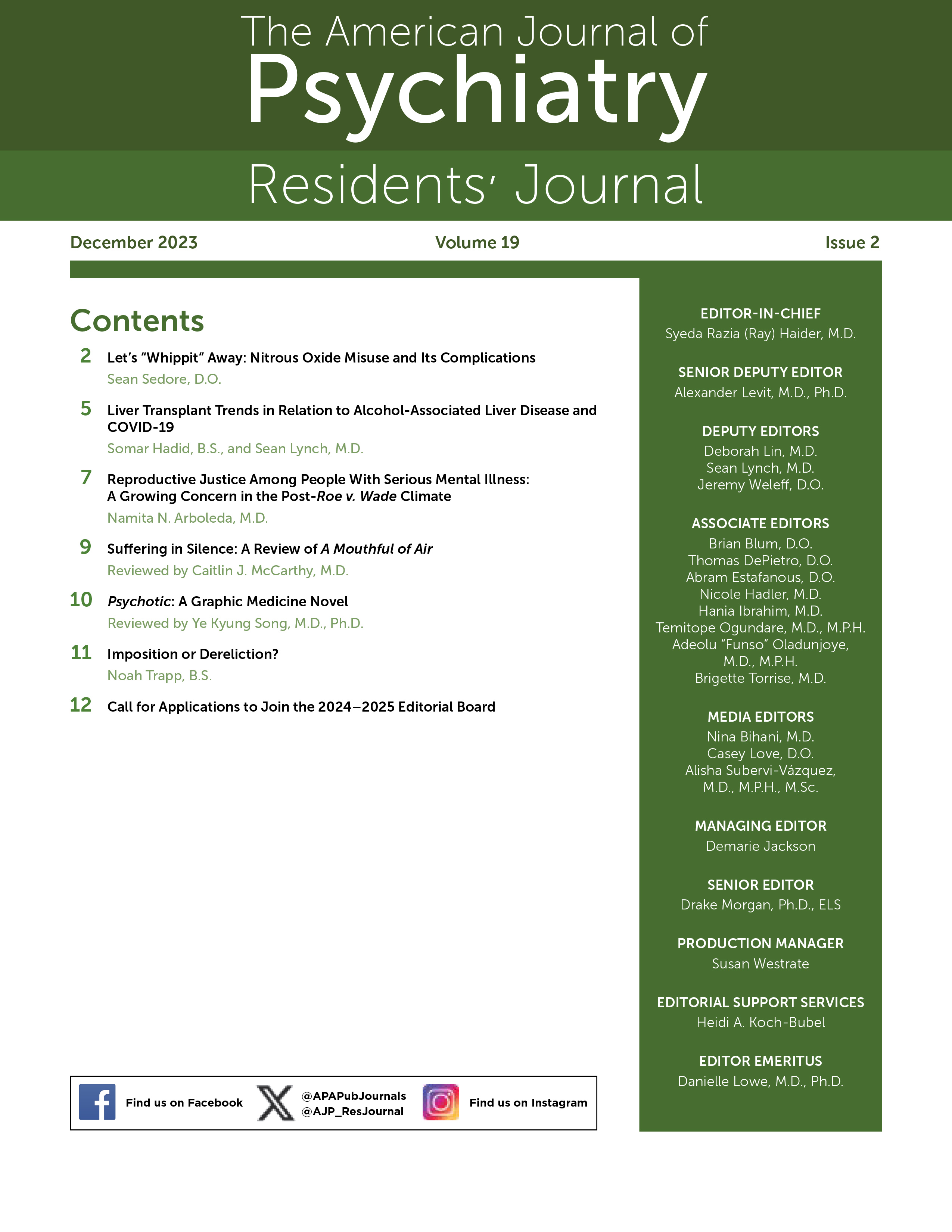Prior to the legalization of abortion with
Roe v. Wade, psychiatrists played a pivotal role in abortion access for women. Because abortions required medical justification, psychiatrists wrote letters for psychiatric exceptions to the restrictive laws in place, and mental health indications were common reasons for access (
1). The overturning of
Roe v. Wade in June 2022 represents an inflection point in the long, tumultuous history of abortion rights in the United States, with immediate implications pertaining to accessibility. Mental health exceptions are currently either omitted or explicitly denied in nearly all states with restrictive abortion laws. Providers in many states are at risk for legal repercussions for performing or helping women obtain abortions (
2). Many physician organizations released statements about how this change would jeopardize the health of women around the country (
3,
4). The American College of Obstetricians and Gynecologists released the following statement (
4): “Today’s decision is a direct blow to bodily autonomy, reproductive health, patient safety, and health equity in the United States. Reversing the constitutional protection for safe, legal abortion established by the Supreme Court nearly 50 years ago exposes pregnant people to arbitrary state-based restrictions, regulations, and bans that will leave many people unable to access needed medical care.” As a psychiatry resident, I have wondered how this would affect my role as a physician.
Just weeks after the Supreme Court’s decision, I took care of a young female patient with schizophrenia who was incidentally found to be pregnant and who had requested a medical abortion during her inpatient psychiatric admission. As I assessed her capacity to make decisions regarding her pregnancy, it became clear to me that despite her mental illness, she was able to fully engage in the decision-making process.
Obstetrics and gynecology (OB-GYN) was consulted to perform the procedure; however, the initial assumption among the OB-GYN team was that she lacked capacity. Despite my explanation of the capacity assessment, the OB-GYN team was hesitant to see the patient. Although she ultimately received the abortion, I was discouraged by my difficulty in advocating for the care she requested. This moment allowed me to see the stigma that surrounds psychiatric patients within the health care system. This patient was also a young Black woman; I wondered how the concept of medical racism may have played a role and introduced an additional layer of bias to her treatment.
Women of reproductive potential with serious mental illness are a vulnerable population that will be deeply affected by the overturning of
Roe v. Wade. They already face stigma and barriers surrounding their mental illness, and now, in many states, they will be subject to further inequity. I thought about what it would mean for this woman with serious mental illness to be forced to have a baby and envisioned the consequences it would have had on her mental health. Studies have shown that women with no history of mental illness who carry unwanted pregnancies to term have poorer mental health outcomes, with up to 1.42 greater odds of depressive episodes later in life than women with wanted pregnancies (
5). The Turnaway Study has also demonstrated that denying women access to abortions may result in negative mental health repercussions, such as worsening anxiety and low self-esteem and life satisfaction (
6). Another complexity to consider is weighing the risks of untreated or undertreated mental illness during pregnancy with the potential risks of psychotropic medications. Thus, forced pregnancy and its subsequent negative impact on mental health is a topic that must be discussed in our field. Given the high proportion of women with mental illness who are affected by unplanned pregnancies, perhaps the scope of psychiatry should expand to play a more collaborative role in family planning.
This experience ultimately showed me the power of advocacy that we hold as physicians. Understanding how policy changes filter down to the individuals we serve provides an opportunity for us as psychiatry residents to champion the safety and autonomy of our patients. Forums for discussion among faculty and trainees are crucial for developing and refining our ability to navigate difficult conversations and conflicts in medicine. Increasing awareness of similarly challenging cases can empower psychiatry trainees as we continue developing our knowledge base, values, and voices as psychiatrists.
Acknowledgments
The author thanks Rubiahna Vaughn, M.D., M.P.H., for mentorship in the development of this commentary.
